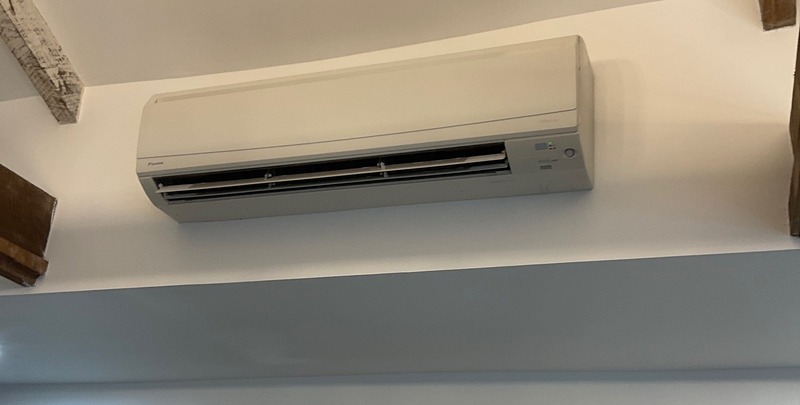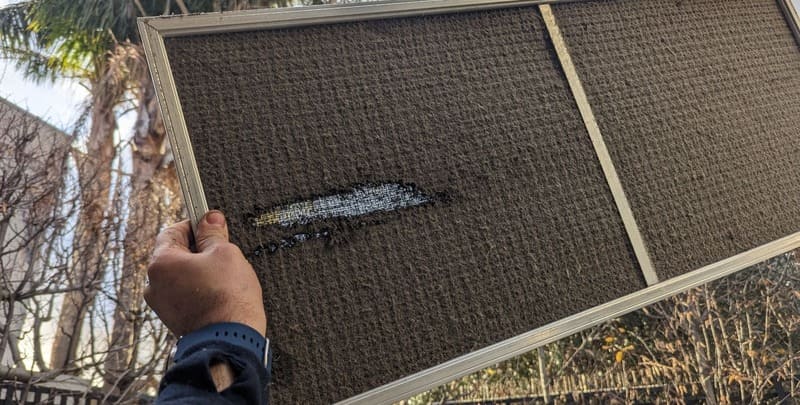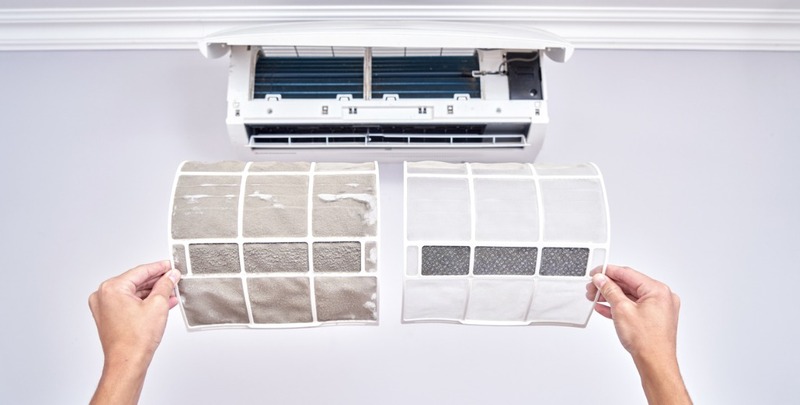Musty smells in HVAC (heating, ventilation and air conditioning) systems are a common problem that many homeowners face. These unpleasant odours can make your living space uncomfortable and even affect your health.
Ensuring clean and odour-free air is vital for the well-being of your family. Your HVAC system plays a crucial role in maintaining indoor air quality, so it’s essential to address the issue of musty smells promptly.
When your HVAC system is free from odours, it has warm air that provides a more pleasant living environment and less energy consumption, helping maintain a healthy atmosphere.
Clean air is vital, especially for individuals with respiratory conditions, allergies or odour sensitivities. This guide will walk you through eliminating musty smells from your HVAC system, ensuring you and your family can breathe easily and comfortably again.
Identifying the Source of the Smell
Musty odours in your HVAC system can originate from various sources. Mould, mildew and stagnant water are some common culprits.
To effectively eliminate the smell, it’s essential to pinpoint the exact reference in your system. Inspect your entire HVAC system for any visible mould or mildew growth signs.
Check air ducts, filters, and any areas where water may have accumulated. Additionally, consider your HVAC system’s age and maintenance history, as neglecting regular upkeep can lead to musty odours.
Once you’ve identified potential sources, you can take appropriate action to address the issue and prevent the smell from returning.

The Risks of Ignoring Musty Smells
Musty smells from your HVAC system can pose several risks to your health and overall comfort and they must not be ignored.
Here are the potential risks associated with musty odours from your indoor unit or HVAC system:
- Respiratory issues: Musty odours indicate mould, mildew, or other microbial growth within the HVAC system. Inhaling airborne mould spores or mycotoxins can lead to respiratory problems, particularly for individuals with allergies, asthma or other preexisting respiratory conditions.
- Allergic reactions: Exposure to musty odours and the contaminants causing them can trigger allergic reactions. Symptoms may include sneezing, coughing, itchy or watery eyes, and skin rashes. These symptoms can significantly affect your quality of life.
- Worsened allergies and asthma: For those with allergies or asthma, musty odours can exacerbate existing conditions. Mold spores and other allergens in the air can lead to more frequent and severe allergy and asthma attacks.
- Compromised immune system: Prolonged exposure to mould and microbial growth can weaken the immune system, making you more susceptible to infections and illnesses. This especially concerns children, older people, and individuals with compromised immune systems.
- Headaches and fatigue: Inhaling musty odours and their pollutants can cause headaches, fatigue and discomfort. This can affect your ability to concentrate and perform daily tasks.
- Odour-related stress: Persistent musty smells in your living environment can cause stress and anxiety. The discomfort of living with unpleasant odours can affect your mental and emotional well-being.
- Structural damage: Musty odours are often an indicator of excess moisture or water damage within your HVAC system. If left unaddressed, this moisture can lead to structural damage, such as rotting of wooden components and insulation deterioration.
- HVAC system damage: Musty odours may result from mould or mildew growth in the HVAC equipment and components, damaging the system AC unit’s efficiency and functionality. Over time, this can lead to costly repairs or premature system failure.
To mitigate these risks, it’s essential to promptly address musty smells in your HVAC system. Identifying and eliminating the source of the odour and maintaining regular HVAC system maintenance can help ensure a healthy and comfortable indoor environment. Consult with professionals to handle severe musty odours and associated issues if necessary.
Safety Precautions to Take
Before you dive into DIY solutions to eliminate musty smells from your HVAC system, it’s crucial to prioritise safety.
Working with heating and cooling air conditioning systems can involve electrical components, and improper handling can lead to accidents or injuries.
Follow these safety precautions before attempting any repairs or maintenance:
- Turn off the power: Always turn off the power to your HVAC system at the circuit breaker to avoid electrical shocks.
- Use protective gear: Wear safety goggles, gloves, and a dust mask to protect yourself from contaminants and airborne particles.
- Proper ventilation: Ensure adequate ventilation in the area you’re working in to minimise exposure to airborne particles and odours.
- Read manuals: Familiarise yourself with the user manuals and safety guidelines your HVAC system manufacturer provides.
- Consult professionals: Consulting a professional HVAC technician is safer if you need clarification on any aspect of the process.
By adhering to these safety precautions, you can confidently minimise risks and work on your HVAC system.

Cleaning and Replacing Filters
Clean filters are vital for good air quality. These are the things you need to know about cleaning your air conditioners:
- Cleaning or replacement: If the filter is reusable, clean it with a vacuum or by rinsing it. If it’s disposable, replace it with a new one.
- Maintenance schedule: Establish a regular schedule for checking and cleaning or replacing filters, typically every 1 to 3 months.
Clean filters help trap particles and prevent musty odours from spreading throughout your home.
Reducing Humidity to Eliminate Musty Smells
High humidity can lead to mould and mildew growth. Here’s how to reduce it:
- Install a dehumidifier: Consider installing a dehumidifier in your HVAC system to control indoor humidity levels.
- Use exhaust fans: Exhaust fans in bathrooms and kitchens to remove excess moisture.
- Regular ventilation: Ensure proper ventilation in your home by periodically opening windows and doors to allow fresh air in.
Maintaining optimal humidity levels can prevent the growth of mould and mildew.
Preventative Maintenance
Preventative maintenance is critical to avoiding future musty odours in your HVAC system. To keep your system in top shape, follow this checklist:
- Regular inspections: Periodically inspect your HVAC system for signs of mould, mildew, or leaks.
- Scheduled filter changes: Stick to a schedule for cleaning or replacing filters.
- Professional maintenance: Consider scheduling annual professional HVAC maintenance to identify and address issues early.
- Ventilation: Ensure good ventilation in your home to prevent humidity buildup.
- Regular cleaning: Clean air ducts and vents to prevent dust and debris accumulation.
Following these preventative measures, you can enjoy consistently clean, cool air and fresh air from your HVAC system.
Seeking Professional Help
In many cases, it’s best to seek professional heating and cooling services. You should consider professional help in the following situations:
- Extensive mould or mildew: If you have a severe mould or mildew problem in your HVAC system, it’s best to call professionals specialising in mould remediation.
- Complex repairs: If you need more confidence in your ability to make repairs or improvements, professional technicians have the expertise to handle complex tasks.
- Outdated systems: Older HVAC systems may require professional attention to operate efficiently and safely.
When seeking professional assistance, research and choose a reputable HVAC technician or service provider to address your needs.

How Professionals Can Help
When musty smells persist in your HVAC system despite your best efforts to address them through DIY methods, it’s time to contact professionals for assistance.
Professional HVAC technicians have the experience, knowledge, and specialised equipment to eliminate these odours effectively. Here’s how they can help:
- Thorough inspection: Professionals will start by conducting a comprehensive inspection of your HVAC system. It involves checking all components, from the air ducts and filters to the coils, condensate, and drain lines. Their experience allows them to identify the source of the persistent musty smell accurately.
- Mould and mildew remediation: Professionals are trained in mould remediation techniques if mould or mildew is the root cause of the odour. They can access industrial-grade cleaners and antimicrobial treatments that eliminate mould and mildew while ensuring it doesn’t return.
- Duct cleaning: Professional heating and cooling technicians have the equipment, such as high-powered vacuums and brushes, to thoroughly clean your heating and air conditioning ducts. They can remove accumulated dust, debris, and microbial growth contributing to the odour.
- Filter replacement and upgrades: Professionals can recommend and install high-quality air filters that effectively trap airborne contaminants, preventing heating and cooling them from causing odours. They can also show maintenance costs and advise you on your system’s best filter maintenance schedule.
- System tune-up: HVAC technicians can perform a complete system tune-up, ensuring that all components of the HVAC unit, including the blower, coils, and fans, are clean and functioning optimally. It not only eliminates odours but also improves your HVAC system efficiency and outdoor unit’s efficiency.
- Ventilation improvement: Professionals can assess your home’s ventilation to its energy efficiency and ensure that it provides proper air circulation and prevents humidity buildup in multiple rooms. They can recommend and install ventilation systems and solutions that maintain ideal humidity levels.
- Expert advice: In addition to addressing the immediate issue, heating and cooling professionals can provide valuable advice on preventing musty smells in the future. They may suggest regular maintenance, routine cleaning routines, air filter and replacement schedules, fresh air requirements, and humidity control measures to keep your HVAC system odour-free.
- Timely repairs: Professionals can promptly identify and repair if mechanical or electrical issues contribute to the odour. They have the expertise to handle complex repairs and ensure that your central air and conditioning system operates safely and efficiently.
- Quality assurance: Professional HVAC services often have guarantees and warranties, ensuring their work is high quality. If the odour issue persists for more air even after their service, they are typically committed to returning and addressing it until it’s entirely resolved.
- Peace of mind: Hiring professionals to address musty smells in your HVAC system provides peace of mind. You can trust that we will effectively handle the problem, restoring your indoor and outside air quality to a clean, energy-efficient, and healthy state.
When musty odours in your HVAC system become persistent, don’t hesitate to contact experienced heating and cooling specialists.
Their expertise and resources can help you enjoy odour-free, clean air while maintaining the overall efficiency and longevity of your HVAC system’s air conditioning unit and cooling equipment.
Breathing Fresh Air at Home
Eliminating musty smells from your heating and cooling system is essential for maintaining clean and fresh indoor air.
You can effectively address this common issue by identifying the source of the scent, following safety precautions, and performing DIY cleaning and maintenance.
When needed, preventative maintenance and professional help can ensure your HVAC system operates efficiently and is odour-free, promoting a healthier and more comfortable living environment. By following these guidelines, your HVAC system should be working efficiently and providing healthy air for many years to come.
Please note: This information is provided for advice purposes only. Regulations differ from state to state, so please consult your local authorities or an industry professional before proceeding with any work. See our Terms & Conditions here.

